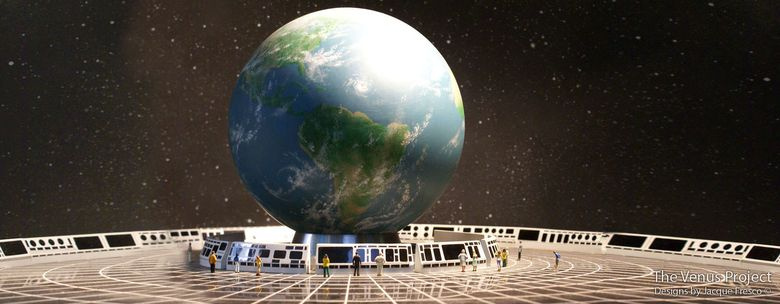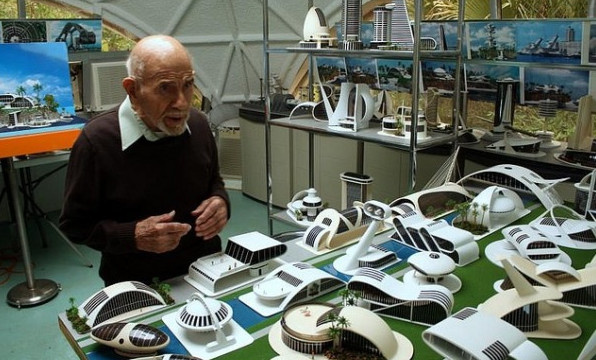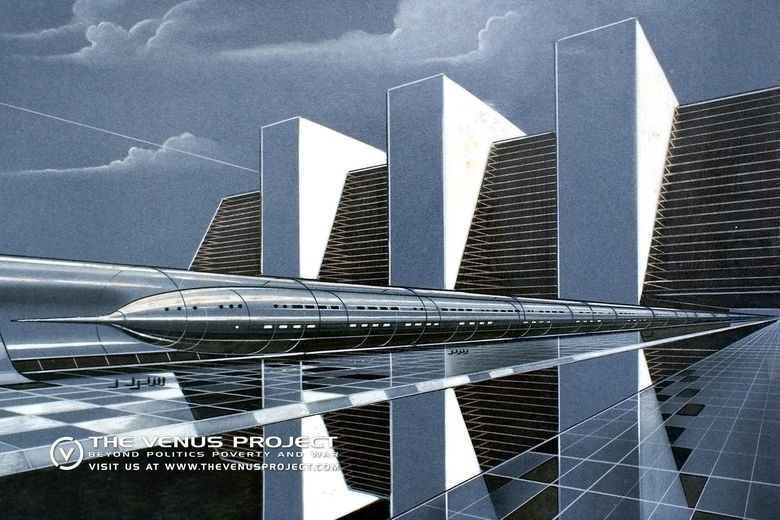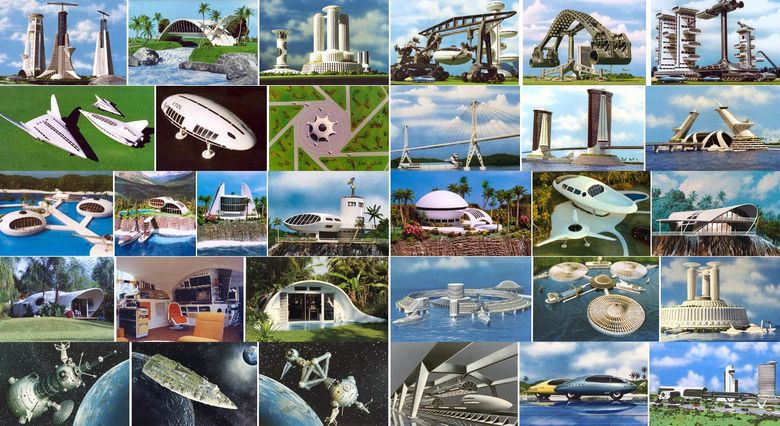Jacques Fresco sociociberinergy

Cover of the book by Jacques Fresco "All the best that you can not buy for money"
Futurologist, social engineer, designer, inventor, industrial designer and a man of global flight - Jacques Fresco left behind a legacy that still causes resentment and admiration throughout the world. His utopian projects are largely doubtful, but in places there is more logic in them than in the world around us. So what is the reason for such heated discussions and incredible respect at the same time?
The fact that you need to think globally, Fresco said back in school. He refused to take the oath of allegiance to the US flag, explaining that America owes its achievements to other cultures and nations. And it is logical to bring such an oath to the Earth and all its inhabitants. It was difficult for teachers to argue with Jacques, so for some time he studied remotely, and then left school altogether.
The Great Depression impressed thirteen-year-old Fresco greatly. Millions of people were starving, they simply had no money, and the factories and plants were idle, although there were raw materials. The picture is even worse than Jacques observed during the Second World War, during which he designed the wings of airplanes. Under the guise of patriotism, promoting the image of an external enemy, a certain group earned good money by spreading militarization in all spheres of social life. Another example, which only consolidated his opinion about the corruption of the war, was the “Project Manhattan”. Resources spent on weapons of mass destruction could be directed to improving the quality of life of people. These events inspired Fresco to create a radically different world — without hunger, war, and poverty.
The beginning of a new world
Jacques Fresco and Roxana Meadows founded the non-profit international non-governmental organization Project Venus (The Venus Project), aimed at achieving a peaceful, sustainable, steadily developing global civilization. The project provides for a transition to a resource-oriented economy , universal automation, the introduction of technology and scientific knowledge in all areas of human life, the use of scientific decision-making methods. The research center is located in the eponymous city of Venus (Venus - "Venus"), Florida, USA.
Jacques Fresco created the "Project Venus" all his life, since the beginning of the Great Depression. The first swallow was the project "Socio-Ukberinzheneriya" (1975), in 1994, he evolved into "Venus". Project ideas are described in detail in books, documentaries and numerous interviews. Some ideas can be seen in the films "Cities in the Sea", "Self-Erecting Structures".
Around the world, there is a large volunteer network of the “Venus Project”. On the territory of the CIS countries, the public organization “Designing the Future” operates. The international linguistic team is responsible for the translation and proofreading of the project materials.
Briefly about the project
“Venus Project” is a socio-economic system, which implies the introduction of automation and technology into all spheres of social life in order to raise the standard of living, rather than make a profit.

Architecture "Project Venus"
Economic change
- Profit ceases to be the main decision-making criterion, as in the capitalist system.
- The transition to a resource-oriented economy, aimed at the benefit of man, and not profit.
- The consequence of this transition - the eradication of crime, poverty, hunger and many other problems.
- Automation performs all the routine work, and a person realizes his creative potential to improve the quality of life of people on the planet.
Social change
- Creating a new value system in which care for the environment and people is raised to the absolute.
- Connecting countries around the world to participate in the "Project Venus".
Project Goals
- Worldwide recognition of the Earth’s natural resources as the property of all mankind.
- Abolition of artificial borders that divide people.
- Transition from money-oriented national economies of individual countries to the world resource-oriented economy.
- Stabilization of the world population through increased education and voluntary birth control.
- Restoration of the environment.
- Transformation of cities, transport systems, agricultural and industrial enterprises into energy-saving, environmentally friendly systems that can meet the needs of all people.
- Gradual complete rejection of such forms of government as corporations and governments (local, national or transnational).
- Interchange of technologies and their use for the benefit of all nations.
- Development and use of clean renewable energy sources.
- Manufacturing only top quality products for all people in the world (for example, by abandoning the concept of planned obsolescence).
- Preliminary studies of any large construction projects for possible environmental impacts.
- Encouragement of creative potential and creative beginning in all its manifestations.
- Freedom from the remnants of the past (nationalism, fanaticism) and prejudice by increasing the level of education of the population of the Earth.
- Elimination of all types of elitism, including technical.
- Developing methodologies through research, not random opinions.
- Creating a new language of communication based on its convergence with the outside world.
- Not only providing people with everything necessary for life, but also cultivating individuality through mind-stimulating tasks.
- Intellectual and emotional preparation of people for the upcoming changes.
The growing number of project supporters and the automation of production are the main factors in the disappearance of monetary relations and the construction of a new social model. The speed of the implementation of Venus at an early stage depends, oddly enough, on financial resources and the awareness of people about the project.
Stages of the project
- Informing the public. On the official website you can find videos, brochures, flyers, posters, press kits, books and much more. Every Saturday there are open tours of the research center.
- The release of documentaries. This will create an optimistic image of the future and bring people around the world together.
- Building an experimental research city with funds raised from the sale of books and films. The city, an example for others, will be the reason for the transition to a resource-based economy.
- Construction of the theme park. He will entertain visitors and inform them about the project and its technical features that can improve human life in the shortest possible time.
What is wrong with the "Venus Project"?
The critical reaction to a fairly utopian program of improving the world (although Jacques Fresco spoke ardently against comparing the project with utopia) is not surprising. A section with the most popular questions and answers to them appeared on the Venus Project website . But this did not greatly save the idea from skepticism.
The beauty and nobility of the idea very quickly broke on the rocks of reality. There are a lot of questions for this project that are rather difficult to answer:
- How do you plan to implement the project taking into account modern realities and limitations?
- Is there a detailed plan for building a high-tech city?
- What problems may arise during the implementation of the “Venus Project” and how to cope with them?
- What are the consequences of a transition to a resource-oriented economy?
And this is just a small part of quite specific questions to the “concrete” and “scientific” project, to which there is still no definite answer.
Consider some of the most precarious provisions:
1. Criticism of free enterprise
Fresco is convinced that free enterprise does not contribute to human progress. An artificial shortage is created to maximize profits, using “planned obsolescence” to maintain cyclical consumption, pollute the environment to reduce costs. Everything revolves around money, profits, and the interests of people fade into the background.
Unfortunately, Fresco considers free enterprise rather one-sidedly, focusing on the negative sides and losing the positive aspects. Such an analysis can hardly be called scientific and objective.
2. Resource-oriented economy and low-income society
The concept of a resource-oriented economy should solve social problems that are caused by inequality of income in the monetary system. The new system does not need money, employment, political parties or the military. Goods are mass produced using modern automated technologies, and people get rid of the need to purchase things for money.
Perhaps the most controversial situation in the whole project. What can make people get rid of money? Refuse to purchase gold, minerals and other expensive and valuable items? What should happen to humanity no longer wish to give value to objects around?
The most interesting thing is that in order to create a cashless society, cash infusions are required, and large enough. In the project there is no specifics, so it is difficult to estimate the scale of the amounts to which it will cost. Yes, and why only the phrase "Buy the book" All the best that you can not buy for money "costs" (this is the title of the publication about the "Venus Project"). Then something suddenly breaks in my head.
3. The problem of falsification of the main provisions and technologies of the project
Strangely enough, the absence of specific statements and reliance on scientific research in the field of economics, sociology, psychology, and technical sciences leads to the fact that the idea of such a society and the world order cannot be falsified. Disputes about the usefulness and applicability of ideas go beyond scientific discussion.
The energy, transport and construction technologies offered by the “Venus Project” are not represented in their current form, which is explained by the insufficient amount of funds for their implementation.

Infrastructure models of the “Venus Project”
The lack of details of tech cities Jacques Fresco explained greed capitalists who could take advantage of his ideas and drawings, but did not - for the sake of their profits. Therefore, for the masses, the project is available in descriptive and demonstration form. You can look at the concepts in one of the domed houses of the research center - “Designed Future”. It contains many large-scale models that demonstrate the capabilities of a resource-oriented economy — a global, sustainable social direction for improving people's lives and protecting the environment.
4. Incompetence of politicians and scientists
Wars, crises, poverty - the consequences of the corruption of politicians and the complete indifference of scientists to people's problems. The reason for this behavior Fresco associates with a narrow specialization in individual disciplines. It interferes with the universal understanding of reality. Politicians for him is the most useless element in society. Only knowledgeable people, scientists possessing universal knowledge can manage people.
"They say:" Write to your congressman. " Who the hell is this donkey you should write to? He must possess advanced technology and knowledge. You should not write to him. I am sure most of you flew on airplanes. You do not need to write to the pilot: “You are flying at an angle! Align the plane, damn it! “He knows his stuff, that's why he got this job! Now lawyers and businessmen are sitting in Washington, they are not able to solve problems. ”
Jacques Fresco
This position is quite charismatic, and arguing with it is quite difficult, but it is worth it. If scientists are distracted by politics, will they have time for science? Enormous managerial and organizational responsibility falls on their shoulders, while ordinary people can safely engage in education and creativity (since all routine work is automated). Is it equal?
5. Creating a single language
Although Fresco managed to be an industrial designer, an architect, a designer, and many more, two areas of knowledge were given to him quite difficult: it is linguistics and psychology. In the latter, he even tried to somehow participate, but scientific circles quickly asked Fresco to do what he was competent for.
Let's go back to linguistics. Fresco was very irritated by the ambiguity of the language, so he dreamed of creating a single universal language, the interpretation of which would be unequivocal. But why didn't mathematics please him? Or can you imagine that any language on the planet be replaced by a mathematical language? Language is a reflection of the culture, the environment in which a person lives and develops. The polysemy of the language reflects the differences of cultures even in the perception of colors, creating a huge field for creativity. What field for creativity will give us the communication of people of the whole world in a uniquely interpreted language?
What technologies are used in the project?

You can challenge a lot of ideas and fantasies Fresco, but with one will have to agree - he is a real visionary. The transport system of the project consists of maglev and electric vehicles. Energy is produced by using the sun, wind and geothermal sources.
Despite the precariousness of explaining the usefulness of a resource-oriented economy, the production technologies that Fresco describes are rather interesting: self-sufficient cities, agriculture in hydroponics and aeroponics, production and construction using 3D printing.

Various concepts of the “Venus Project”
Another no less interesting idea Fresco became sea cities. From the sea, you can get energy, food, minerals, medicines ... These resources are able to provide food for all the hungry Earth. Such cities can be built around the world and controlled by computer systems connected by a single information network.
If we take into account that the project has been developing for a long time, it is necessary to recognize that some elements of the future and their massive use, he still foresaw.
Instead of a conclusion. The future is in our hands
Over the past 50 years, only lazy has not spoken about the utopianism of the “Venus Project”. On its failure, denial and misunderstanding of human nature. The fact that Fresco under the guise of universal welfare imposes a new ideology on everyone. Be that as it may, his work was not ignored. The dreamer man, realizing his dreams and surrounding himself with them, inspired so many people to study science, to improve the world, to take care of the environment, to create concepts of residential cities of the future. To stop thinking and start acting, bringing more and more order and creative changes into the world around us.
List of sources
All Articles